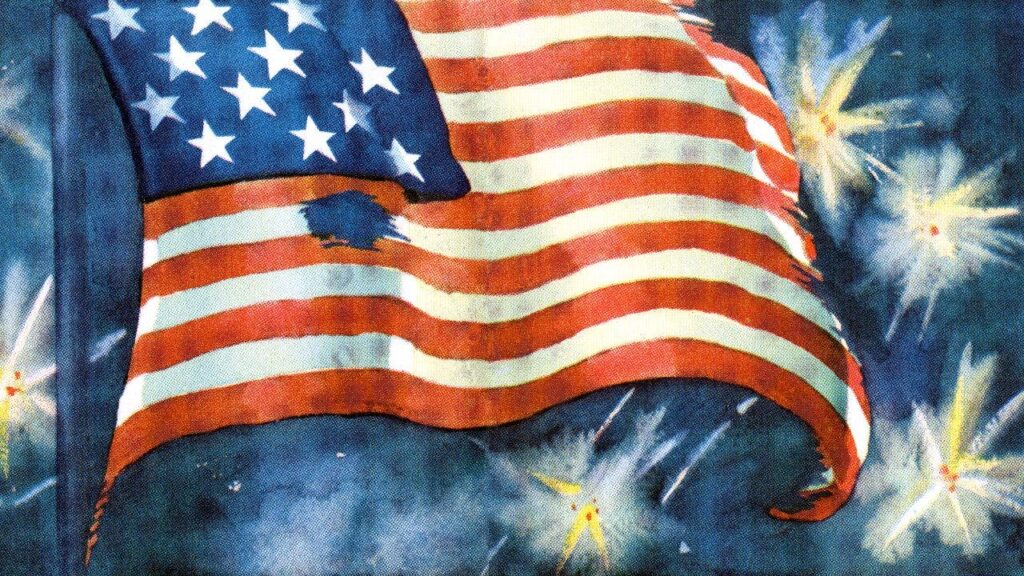On September 14, 1814, Francis Scott Key, a Baltimore attorney, experienced a pivotal moment in American history while aboard a British warship. He had been watching the 25-hour bombardment of Fort McHenry, which was part of the larger conflict known as the War of 1812. As dawn broke, he was filled with astonishment and relief to see that the American flag still waved defiantly over the fort. This event significantly inspired Key, igniting a wave of patriotic fervor within him as he witnessed the resilience of his fellow countrymen amidst a relentless assault on their homeland.
Motivated by the events of that harrowing night, Key quickly set to work documenting his emotions and observations. Over the next two days, he penned a poem that encapsulated the vivid imagery of the battle, which would later be recognized as “The Star-Spangled Banner,” the United States’ national anthem. Key’s words captured the essence of American spirit with lines like, “The rocket’s red glare, the bomb bursting in air/Gave proof through the night that our flag was still there.” His verses reflected not only the physical ordeal faced by Fort McHenry but also the broader sense of determination that gripped the young republic.
At the time, the United States had just suffered a significant defeat three weeks earlier when British troops swept into Washington, D.C., infamously burning key government buildings, including the White House and the Capitol. This string of humiliations raised doubts about America’s ability to withstand British might. Many believed that Fort McHenry, located only 40 miles from the nation’s capital, would fall under the relentless bombardment from British warships equipped with superior weaponry. Key observed the onslaught, stating, “Mother earth … was vomiting shot and shell in a sheet of fire and brimstone.” The ferocity of the British attack and the resulting tension highlighted the fragile state of the fledgling nation.
Despite the tremendous odds against them, the soldiers at Fort McHenry exhibited unwavering resolve, which deeply resonated with Key. His brother-in-law was among the commanders on the ground at the fort, and upon reading Key’s stirring lines, instructed that the poem be disseminated under the title “Defence of Fort M’Henry.” The publication spread quickly, as the Baltimore Patriot newspaper featured the poem, and within a short period, Key’s words resonated across the country, crystallizing the passion and loyalty felt by Americans.
Key’s poem was eventually adopted as the national anthem of the United States through an Act of Congress, signed into law by President Herbert Hoover in 1931. The words of “The Star-Spangled Banner” continue to remind Americans of their nation’s history and sacrifices. The actual flag that inspired Key, measuring an impressive 42 feet by 30 feet and adorned with 15 stars and stripes, is preserved today at the National Museum of American History in Washington, D.C. Known as the Great Garrison Flag, it symbolizes American unity and identity.
The creation of such a significant flag began when Major George Armistead, the fort’s commander, foresaw the necessity of a large banner for display during the ongoing War of 1812. He commissioned Mary Pickersgill, a widow and skilled flag maker, to craft the flag alongside her family and assistants. The collective efforts to create this emblem of hope included Mary’s 13-year-old daughter, Caroline, her two nieces, Grace Wisher, an African American indentured servant, and possibly her mother, Rebecca Young. Together, they pieced together this monumental flag over several weeks, which served as a powerful statement of resilience.
Today, Fort McHenry stands not only as a historic site but also as a national monument that honors those who defended it. The state of Maryland commemorates these acts of bravery every year with Defenders Day on September 12. The fort’s historical significance is immortalized, serving as a reminder of the sacrifices made during a turbulent period in American history, and the resilient spirit that still defines the nation.



